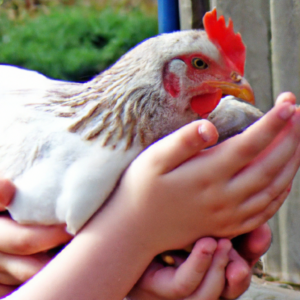
Have you ever wondered if chickens can be trained to do tricks or respond to commands? Contrary to popular belief, chickens are actually highly intelligent animals that can be trained to perform a variety of tasks and respond to specific cues. From simple tricks like jumping over hurdles to more complex tasks like fetching objects, chickens have proven themselves to be capable learners. So, if you’re looking to add some entertainment and interaction to your backyard farm, training your chickens might be a fun and rewarding endeavor.

Overview
Understanding chicken behavior
Understanding chicken behavior is essential when it comes to training them. Chickens are social creatures with a complex natural instinct. They have a pecking order within their flock and use various communication methods to interact with each other. By observing their behavior, you can gain insights into their needs, preferences, and motivations, which are crucial for effective training.
Training methods
There are various training methods that can be used to train chickens. These methods focus on positive reinforcement, using rewards and cues to encourage desired behavior. Some popular techniques include clicker training and target training. Each method has its own advantages and can be adapted to suit individual chicken personalities and learning styles.
Challenges of Training Chickens
Natural instincts
Chickens have natural instincts that can sometimes pose challenges during training. Their instinct to forage for food, explore their surroundings, and establish a social hierarchy can distract them from focusing on training tasks. It’s important to understand and work with these instincts rather than against them to achieve successful training outcomes.
Lack of motivation
Chickens are not inherently motivated to perform tricks or respond to commands like some other animals such as dogs. They have their own priorities, such as food and safety. Motivating them to engage in training activities requires finding the right incentives and rewards that appeal to their instincts and preferences.
Short attention span
Chickens have a relatively short attention span compared to animals like dogs. They can easily get distracted by their surroundings or lose interest in training tasks. As a trainer, you need to be patient and adapt your training sessions to accommodate their attention span. Keeping sessions short and engaging can help maintain their focus and increase training effectiveness.

Training Techniques for Chickens
Positive reinforcement
Positive reinforcement is a widely used and effective training technique for chickens. It involves rewarding desired behaviors with treats or praise. By associating the behavior with a positive outcome, chickens are motivated to repeat the behavior. Positive reinforcement creates a bond of trust between the trainer and the chicken, making future training sessions more successful.
Clicker training
Clicker training is a precise and efficient method used to train chickens. It involves using a small handheld device that emits a distinct clicking sound. The click serves as an immediate signal to the chicken that they have performed the desired behavior correctly. Clicker training helps chickens understand quickly which specific action leads to a reward, making the training process clearer and faster.
Target training
Target training involves teaching chickens to touch or follow a specific target, such as a stick or a colored object. By rewarding the chicken for touching or following the target, they learn to associate the behavior with positive reinforcement. Target training is particularly useful for teaching chickens more complex tricks and tasks, as it helps break down the behavior into manageable steps.
Step-by-Step Training Process
Establishing trust
Establishing trust with your chicken is a crucial first step in the training process. Spend time bonding with your chicken by hand-feeding them and speaking softly to them. This helps build a positive association with your presence and shows them that you can be trusted. Building trust sets a strong foundation for further training and creates a positive training environment.
Teaching basic commands
Once trust is established, you can start teaching your chicken basic commands. Use simple cues like a hand signal or a verbal command, accompanied by rewards, to teach them behaviors such as sit, come, or stay. Start with one command at a time, gradually increasing the difficulty as your chicken becomes comfortable with each command. Consistency and repetition are key to reinforce learning.
Advancing to tricks
After your chicken has mastered basic commands, you can advance to teaching them tricks. Some common tricks include fetching objects, jumping through hoops, or even pecking specific keys on a piano. Break down the trick into smaller steps, rewarding and reinforcing each step along the way. With patience and consistent practice, chickens can learn surprising and entertaining tricks.

Common Tricks and Commands for Chickens
Fetching objects
Chickens can be trained to fetch small objects by teaching them to pick up the object with their beak and bring it back to you. This trick can be expanded to include retrieving specific items or even identifying objects by color or shape. Start with lightweight objects and gradually increase the difficulty level as your chicken becomes more adept at the task.
Performing tasks
Chickens can also be trained to perform simple tasks, such as turning on a light switch, opening a small door, or pushing a button. This requires target training and shaping their behavior to achieve the desired outcome. By breaking down the task into manageable steps and providing rewards for each successful action, chickens can learn to perform a variety of helpful tasks.
Playing a musical instrument
Believe it or not, chickens can be trained to play musical instruments! By using target training and shaping their behavior, chickens can learn to peck specific keys on a piano or produce different sounds on a xylophone. This requires patience, persistence, and a good understanding of the target training technique. With practice, your chicken can become a fine feathered musician!
Benefits of Training Chickens
Bonding with your chicken
Training chickens provides an opportunity to bond with them on a deeper level. By spending time together during training sessions, you create a positive and trusting relationship. The chicken learns to associate your presence with fun and rewards, strengthening the bond between you. This bond can extend beyond training sessions, enhancing the overall human-animal connection.
Educational and entertaining
Training chickens can be both educational and entertaining. It offers a unique opportunity to learn about chicken behavior, cognition, and learning abilities. As you discover what motivates your chicken and how they learn best, you gain insights into their individual personalities. Additionally, training chickens to perform tricks can be a source of amusement for yourself, friends, and family.
Enhancing chicken welfare
Training chickens not only provides mental stimulation and enrichment but also enhances their overall welfare. Chickens in a domestic setting can sometimes face boredom and lack of mental challenges. Training engages their natural instincts and provides them with mental stimulation, thus improving their overall well-being. Training also helps chickens to become more cooperative during husbandry practices, making their care easier and less stressful.
Training Tips and Considerations
Start with simple tasks
When beginning chicken training, start with simple tasks that are easier for your chicken to understand and perform. As they gain confidence and skills, you can gradually increase the complexity of the tasks or tricks. Starting with achievable goals ensures a positive training experience for both you and your chicken, setting the stage for further learning.
Be patient and consistent
Training chickens requires patience and consistency. Chickens may not understand what is expected of them right away, and it takes time for them to learn and form associations. Stay positive, keep training sessions short and frequent, and be consistent with your commands and rewards. Repetition and consistency help reinforce learning and allow chickens to become more proficient over time.
Use treats as rewards
Using treats as rewards is an effective way to motivate chickens during training. Find treats that your chicken finds particularly enticing, such as mealworms or small pieces of fruit. Use these treats to reward desired behaviors immediately after they are performed. Make sure the treats are small and easy for the chicken to consume quickly, so there is minimal interruption to the training process.
Frequently Asked Questions (FAQs)
Can any chicken breed be trained?
Yes, any chicken breed can be trained. However, some breeds may be more trainable or have a higher motivation to engage in training activities. Breeds with a calmer temperament, such as the Silkie or the Orpington, tend to be more responsive to training, while flightier breeds may require more patience and effort. Regardless of the breed, individual personalities and experiences also play a role in a chicken’s trainability.
At what age should training begin?
Training can begin at any age, but it is generally recommended to start training chickens when they are young. Young chickens are more receptive to learning and adapting to new experiences. Starting training when chickens are chicks allows them to become comfortable with handling and human interaction early on, leading to better training outcomes in the future.
How long does it take to train a chicken?
The duration of chicken training can vary depending on the individual chicken, the complexity of the tasks or tricks, and the consistency of training sessions. Simple commands and tricks can be learned within a few weeks with regular training sessions. However, more complex behaviors may take several months of consistent practice. The key is to be patient, adapt to each chicken’s learning pace, and celebrate every small achievement along the way.
Myths and Misconceptions
Chickens are not intelligent
Contrary to popular belief, chickens are intelligent animals with the ability to learn, problem-solve, and display complex social behaviors. They have been shown to possess skills such as spatial memory, numerical cognition, and self-control. By understanding their natural instincts and finding the right training methods, chickens can surprise us with their cognitive abilities and capacity for learning.
Training chickens is cruel
Training chickens can be a positive and enriching experience for both the trainer and the chicken. It involves using positive reinforcement techniques that focus on rewarding desired behaviors rather than punishing unwanted behaviors. Training sessions should be enjoyable and stress-free for the chicken, with an emphasis on building trust and strengthening the human-animal bond. When done correctly, training can improve the welfare and quality of life for domesticated chickens.
Conclusion
Training chickens to do tricks and respond to commands is a fun and rewarding activity that benefits both the chicken and the trainer. By understanding chicken behavior, using effective training techniques, and patiently working through the training process, you can teach chickens a variety of enjoyable and entertaining tricks. Training not only enhances the bond between you and your chicken but also provides mental stimulation and promotes overall chicken welfare. So grab some treats, create a positive training environment, and embark on an exciting journey of training your chickens to be clever, cooperative, and charming companions.







